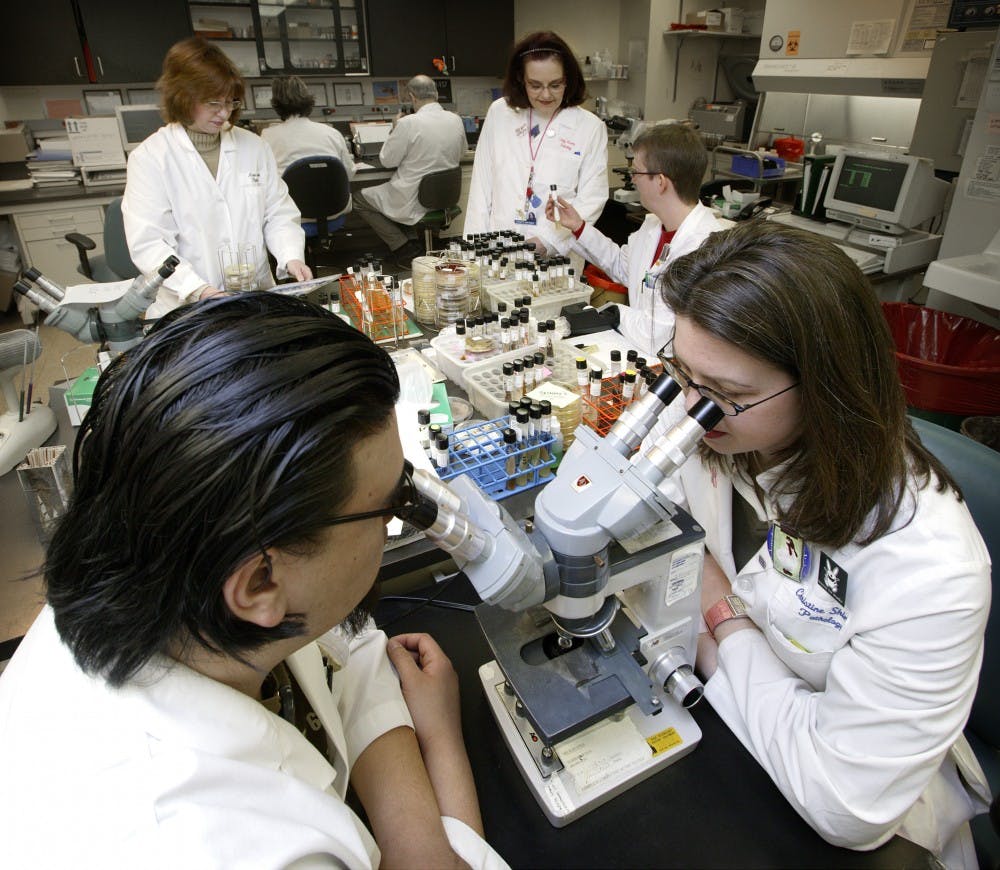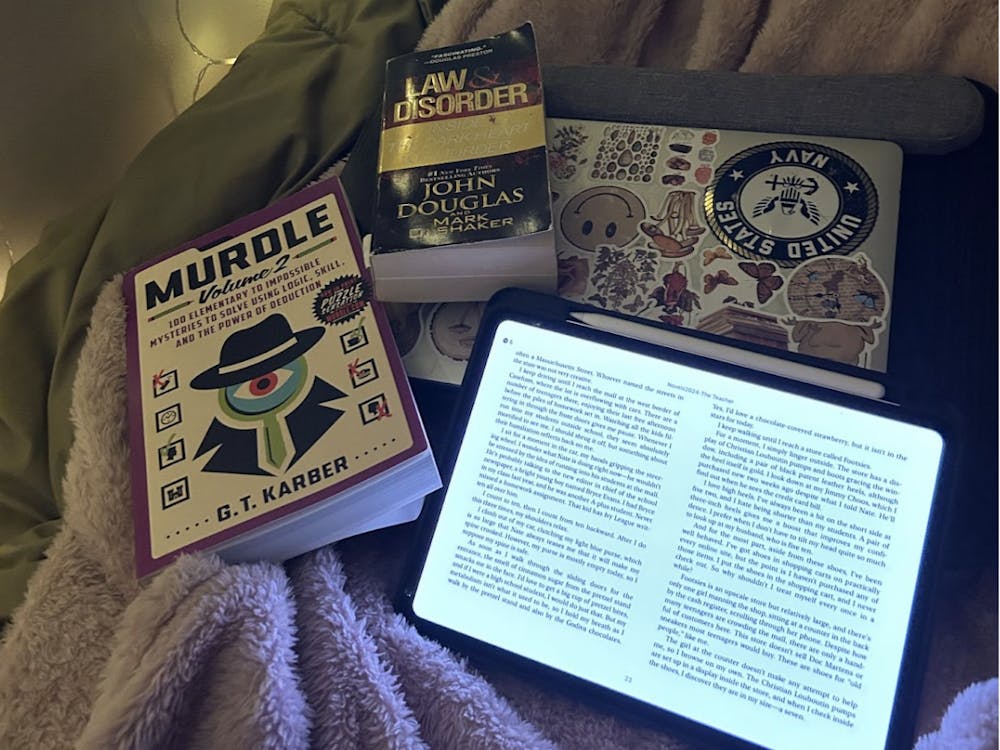Around 85 percent of students on campus are involved in some kind of research, whether it’s in the natural sciences, social sciences or the humanities.
For new freshmen eager to tackle their first research project or upperclassmen looking to diversify their academic pursuits, reaching out to potential mentors and finding research positions can be a challenging and confusing process.
Luckily, the Hopkins Office for Undergraduate Research (HOUR) and fellow undergraduate researchers are here to make the process easier.
The Hopkins Office for Undergraduate Research is here to help.
In the words of Tracy Smith, the director of HOUR, the office is a resource for nearly any research need. While only in its third year of operation, HOUR has helped countless undergraduates get connected with research.
“The purpose of HOUR is to help facilitate research opportunities for undergraduates and help faculty or mentors find undergraduates for research projects,” Smith said in an interview with The News-Letter. “On the other side, we provide presentation opportunities for our undergraduates for their research and help to provide funding for them to go to conferences and spotlight their research.”
While HOUR stands mainly as a connection resource for undergraduates and the Hopkins community at large, if mentors are actively seeking undergraduates, they will often contact HOUR in order to get their position posted on Handshake — a job portal for the Hopkins community.
Although the hiring department for these positions is listed as HOUR, Smith clarified that she does not personally vet any of the applications, and for good reason.
“When faculty reach out to me, I post the position in Handshake, but I don’t vet any of the applicants,” Smith said. “Whether or not you have the direct experience or skills they’re looking for, you may be able to sell yourself as an undergraduate researcher with other skills that they need or personality traits that they’re looking for.”
Finding your first opportunity.
Smith is already in the process of meeting with freshmen who are looking for their first research positions at Hopkins.
When students email her, she sets up a time and meeting place that works for both her and the student.
If you are looking to start contacting mentors, but do not have time for an appointment just yet, she recommends visiting the “Getting Started” page on HOUR’s website.
In addition, you can also find potential opportunities through ForagerOne, a platform made with the undergraduate researcher in mind, or a simple Google search. Smith encourages undergraduates to figure out how much time they can dedicate before they craft their emails.
“Before you reach out to a mentor you need to think about your limitations,” Smith said. “As a freshman, there might be only so much time you can fit in, and as you advance in your undergraduate career you can modify your schedule to have more free time to do bigger blocks for research.”
Time management is another important aspect of research. Smith stressed the importance of accounting for commuting time if you work at a campus other than Homewood and making sure that you are able to maintaining a healthy work-life balance.
“It’s important to do self care to have that balance, and to put in time to just relax and chill with your friends,” Smith said.
She also stresses that with such an amazing opportunity to research, you don’t want to burn out.
If you do decide that a lab isn’t the best fit for you, it’s important to not ‘ghost’ the professor or burn bridges. Simply explain to your mentor that you’d like to explore other options to keep you moving in the right direction. Keeping on good terms with professors can come in handy if you need their help in the future.
Crafting your first email.
Once you know how much time you can dedicate to research and have found some interesting labs, it is time to craft your initial email. The main point Smith stresses in drafting this communication is brevity.
“An initial email needs to be brief; one screen on your phone,” Smith said.
Additional tips she offered for a first email include using your Hopkins email because it validates you as a student; giving your year and major, and expressing your interest in their research. If you have previous experience, you’re welcome to attach it, but it’s not required.
Smith also recommends Blind Carbon Copying (BCCing) yourself on your emails to professors so that it’s easier to follow up and so that you can keep track of all the emails you send.
Following up is a good idea if you have not heard back from a professor in three or four days. Smith stresses persistence, and says that you can follow up three to four times.
“You won’t get put on a list for stalking,” Smith said jokingly.
If a professor does not reply, or says that they do not have a position available, you can always ask if they have any colleagues who do work in similar areas. In that vein, do not be afraid to email multiple professors at once.
When you meet with a potential mentor, you should discuss what your expectations are (a paper, presentation, general experience), how many hours you can work, and whether you will be volunteering, working for credit or being paid.
Many students start by volunteering for a semester, and then begin receiving credit later on.
If you are set on gaining credit for your work, you should know that if you work on the medical campus, you will need to find a faculty sponsor back at Homewood to grant you credit.
Tips from current student researchers.
To gather some tips from actual undergraduate researchers we spoke to two students studying Economics and Biology.
Hunter Hopkins is a junior double majoring in Economics and International Studies. She is a researcher for the Hopkins Institute for Applied Economics, Global Health and the Study of Business enterprise, where she works with Professor Steve H. Hanke.
She said that she had not anticipated doing research before coming to Hopkins, but was quickly convinced to give it a shot after talking with her peers.
“I heard about the position from a brother in AKPsi (The University’s co-ed business fraternity),” Hopkins said in an interview with The News-Letter. “After hearing peers talk about their research, I began to feel I was missing a crucial part of the Hopkins experience. To participate in research here gives unique insight into how innovation takes place in many industries.”
Hopkins works out of a research lab in Ames known by students as “the bullpen.” There, she explained, she does a combination of collaborative and individual work.
“A lot of what we do is peer taught – learning from more experienced students,” Hopkins said. “There are also projects where you will work directly with the professor. Projects can range from tracking inflation data to writing working papers.”
She advises anyone interested in economics research to try to narrow down their interests before searching for potential mentors, given that economics is a broad field of study.
“Read a bit about what is happening in economics right now – monetary policy changes, hyperinflation cases, fiscal policy theories in various countries, for example – and see what interests you,” Hopkins said. “Chances are there is a professor at Hopkins working in that area, and you can send the professor a polite email inquiring about their work.”
Evan Qu, a senior majoring in Molecular and Cellular Biology, had a similar experience getting involved in research.
Although he knew biology was an area of interest for him, he was not sure what field interested him the most until he came to Hopkins and found a lab. He now works in the lab of microbial ecologist Jocelyne DiRuggiero, where he found his niche.
“What really interested me about the lab is this concept of astrobiology which I had never really heard of before Hopkins,” Qu said. “I’d never found something that really captured my imagination like that.”
Before sending emails to labs he found interesting, Qu read research papers from the lab and attached his resume, but notes that he did not come to Hopkins with great amounts of research experience.
“I had barely any experience and I had never worked in a research lab before,” Qu said. “I think what professors are looking for are your interests and if you can write something thoughtful about why this area of research matters to you.”
In the lab, Qu has spent the past two and a half years studying the global diversity of desert microbes — an independent project that was leftover by a postdoc in the lab.
The project has culminated in a soon-to-be published paper. Qu emphasized that if you are willing to put in the time and take on some responsibility, it never hurts to share your ideas with others.
Qu’s best advice for students interested in biological research is to reach out to professors and your peers, even outside the academic setting.
“Chances are if you have an interest, someone at Hopkins has a similar interest,” he said.
He noted that organizations like TCO Labs and Agara Bio, which focus on entrepreneurship and community based biology respectively, can be very helpful if you are looking for someone to bounce ideas off of. Student groups also offer unique insight from not only upperclassmen, but also advisors.
Qu said that participating in research has been an incredibly enriching experience and that Hopkins is full of resources intended to help undergraduate students.
“I think the one thing you don’t know before you come to college is that everyone here wants to help you,” he said.
“So, if you have a question or want assistance from someone, just ask them. No other time in your life will there be so many talented people just waiting to help you.”
Qu expressed how positive his experience with research at Hopkins has been.
“I’ve spent the past three and a half years here and I think that it’s the coolest research there is,” he said. “Out of all my experiences at Hopkins, I regret this one the least. It’s probably the best decision I’ve made at Hopkins.”





